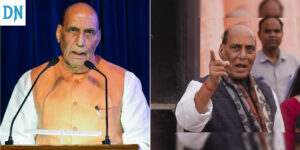UNSC Holds Closed Consultations on Indo-Pak Tensions as India Seeks Majority Backing for Post-Pahalgam Push Against Pakistan
The UNSC holds closed consultations today amid rising Indo-Pak tensions, as India moves to secure majority support for its post-Pahalgam diplomatic push against Pakistan.
In a significant development that’s dominating today’s trending news, the United Nations Security Council (UNSC) is holding a closed consultation on escalating Indo-Pak tensions. The urgency was triggered by the April 22 Pahalgam terror attack in Jammu and Kashmir, which left 26 civilians dead. India has directly attributed the attack to Pakistan-backed terror outfits, intensifying calls for international scrutiny of Pakistan’s role in sponsoring cross-border militancy.
The UNSC meeting, scheduled for today under Greece’s rotating presidency, comes after Pakistan formally requested emergency consultations. However, India has already launched a parallel diplomatic offensive, working behind the scenes to push cross-border terrorism into the international spotlight. This story has not only gripped South Asia but is making waves across Top 10 news today on several international platforms.
India Rallies Support at the UNSC(UNSC holds closed consultations)
Over the past two weeks, Indian External Affairs Minister S. Jaishankar has personally engaged with 13 of the 15 UNSC members, excluding China and Pakistan, to secure backing for India’s position. According to Indian officials, the UNSC consultations are aimed at framing the Kashmir issue as one of terrorism, not territorial dispute. This aligns with India’s broader diplomatic playbook and its long-term ambition to secure a permanent seat at the UNSC.
Jaishankar’s outreach has received strong backing from key nations, including the U.S., France, the U.K., and Russia. Nations from the Global South, such as Algeria and Sierra Leone, have also extended support. India’s argument centers around the patronage enjoyed by terror groups like Lashkar-e-Taiba (LeT) and Jaish-e-Mohammed (JeM) from Pakistan’s military-intelligence establishment.
Pakistan’s Counteroffensive at the UN
In what can only be described as a diplomatic counteroffensive, Pakistan is attempting to turn the tables. At a press briefing last week, Pakistan’s Permanent Representative to the UN, Ambassador Asim Iftikhar Ahmad, accused India of “aggressive actions and repeated provocations.” Islamabad also raised India’s suspension of the Indus Waters Treaty, calling it a unilateral violation of international law.
As Indo-Pak tensions continue to rise, Islamabad insists that India’s rhetoric and actions pose a serious threat to regional and global peace. Pakistan is pressing the UNSC to intervene and address what it describes as India’s attempts to destabilize South Asia.
UNSC Diplomacy: A Battle of Narratives
Today’s UNSC consultations underscore how diplomacy is increasingly being used as a tool of global messaging. While Pakistan frames the Kashmir situation as a human rights issue, India is presenting it as a terrorism challenge. This reframing is a calculated move to influence international perception one that appears to be gaining traction.
In the wake of the Pahalgam attack, a terror group called The Resistance Front, believed to be a proxy of LeT, initially claimed responsibility before retracting the statement. Indian intelligence sources confirmed that the attack was planned and executed with support from handlers across the Line of Control. These revelations have further fueled Indo-Pak tensions, making today’s UNSC discussion one of the most critical in recent years.
Global Attention on Regional Conflict
This issue has become a focal point in the latest news headlines, especially due to the potential impact on regional peace between two nuclear-armed neighbors. Iran has even sent its top diplomat to Islamabad, offering to mediate as tensions grow. With diplomatic lines open and backchannel talks expected, today’s UNSC meeting could pave the way for further dialogue—or deepen the divide.
India’s effort to rally support is not just about immediate security concerns; it’s a statement of global legitimacy. By presenting itself as a responsible international actor combating terrorism, India strengthens its case for inclusion in top multilateral institutions, reflecting the growing shift in global power balances.














Post Comment